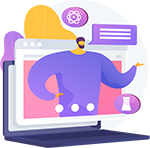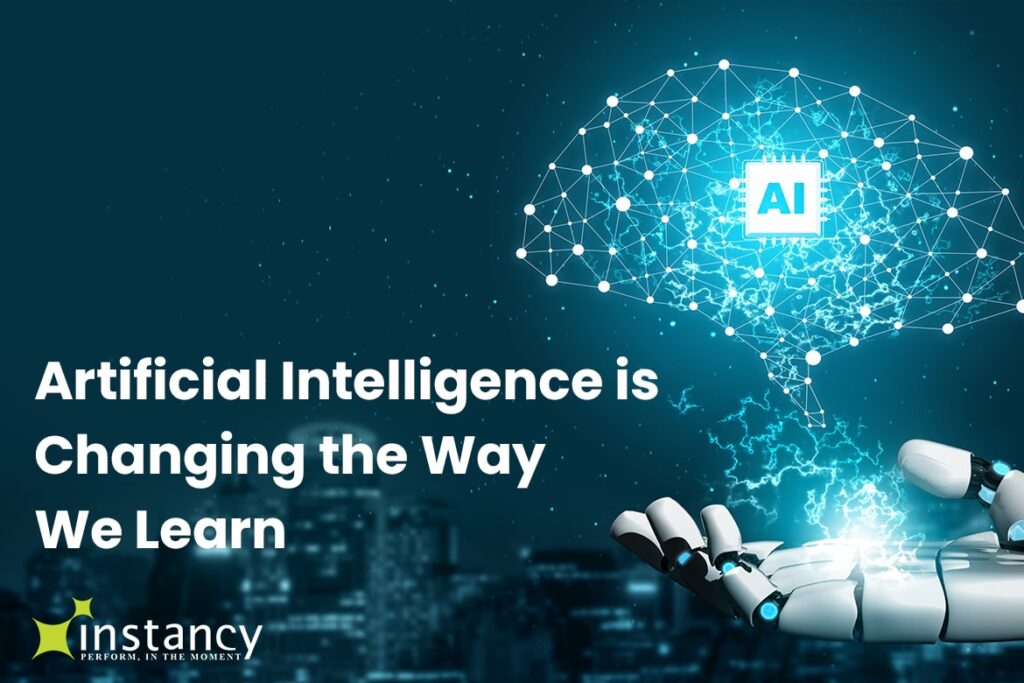Artificial Intelligence (AI) has evolved, emerged, and integrated into our everyday way of life. AI technology is being used to automate tasks by processing and analyzing information or data to recognize patterns, decision-making, enhance productivity, and maximize performance.
Artificial Intelligence is essentially a set of algorithms that can generate results without being explicitly instructed to do so. Some describe AI as a meticulous process of reverse engineering human traits and capabilities in a machine while, in parallel, deploying its computational abilities to surpass standard human capacity. It aids human capabilities in making advanced decisions with far-reaching consequences. Artificial intelligence is characterized by its ability to rationalize and take actions that are best suited to achieve specific goals.
Learning and development experts also strive to explore and implement AI to develop new training strategies and techniques. The most important way AI can impact the training, learning, and development sector is by assisting organizers in establishing more optimized and effective training methods and techniques. Here are seven effective ways of how AI can transform the way we learn:
1. Personalized Learning: While AI can be viewed as simply another feature of learning technology, using the true potential of AI calls for looking at personalized learning through a completely different lens. The presentation of personalized content will mandatorily accommodate personal preferences and learning styles for every individual learner, which would not be possible without Artificial Intelligence. Preparing AI to aid with personalized learning involves it being exposed to as many variables as possible, using a variety of input data. Learners need online resources that can fill gaps and help in achieving learning goals. Predicting outcomes, providing specific content based on the learner’s past performance and individual goals are ways of doing this. Targeted recommendations help build knowledge related to the learner’s skill gap in a personalized format. Some of the other benefits of personalized learning with the application of Artificial Intelligence are listed below:
- Reduced Learning Time: Presenting personalized content to learners can help them achieve the learning goals much faster.
- Engaging Content: AI analyses and proposes a learning program to each learner based on their past performances and objectives. This makes the learning pathway more immersive and engaging to the learner.
- Automated Learning Process: AI can help construct a learning program where all data, programs, materials, schedules are based on the learner’s experience and preferences. The objectives are stored, tracked, and delivered.
- Growing ROI: Faster, engaging, and immersive programs lead to better learning outcomes, thereby positively impacting the companies’ learning investment.
2. Adaptive Learning: With the coming of age of artificial intelligence in education, learning in current times is smarter, leaner, online, and global. With minimal dependency on physical location or tangible learning, material learning is redefined in its methodology. Adaptive learning platforms use Artificial Intelligence to understand the learner’s strengths, weaknesses, learning styles, and proficiency before providing them with the necessary learning resources and material. As we dwell on the subject of adaptive learning technology, there are specific key points to keep in mind:
- The quality of educational content that is used.
- How the AI-based platform identifies, assesses, and adjusts to the learner’s progress.
- Tracking and calibrating performances and leveling up based on results.
With the evolution in human learning, customized learning systems are taking over conventional methodologies. The benefit of AI in adaptive learning is evident as more and more institutions are taking to orchestrated interactions.
The ‘recommender system’ used by AI and machine learning collates data across all learners in the learning system and tracks the learners’ past learning activities and competency requirements to recommend the best possible learning activity or content.
The learning sequence subsequently adapts to the skill and knowledge level while in parallel adjusting to the difficulty level of content or questions presented. Adaptive learning utilizes technology and algorithms for delivering customized learning programs to the learner. The advantage of adaptive learning techniques is that they reduce both the costs and administrative burden incurred with delivering content using traditional learning methods. A conversational interface is leveraged to gather information about user behavior and patterns to enhance the effectiveness in the process of learning.
3. Chatbots: Conversational AI-powered bots do much more than just converse. Designed to authentically simulate how a human behaves as a conversational partner, chatbots are used in dialog systems for multiple purposes. Education chatbots assist the learner by providing them with learning material on any topic that is both engaging and interactive. It helps them learn quicker through visuals, speech, or videos and helps with the evaluation of their responses to gauge their learning. An educational chatbot helps improve communication, improve productivity and minimize ambiguity from interactions. It keeps the conversations to the point and focuses on result-oriented interactions, thereby taking the learning outcome to fruition. A chatbot can assist the learner with the teaching and deploy blended learning to present learning activities that range from quizzes, games, simulations, and live tutor support to help the learner every step of the way.
4. Learning Content Analytics: Knowledge is no longer a static piece of information; it is a dynamic process that is continually changing and evolving. Data is necessary to feed algorithms. However, it is important to be able to transform any data that is collected into useful information. Natural learning processes (NLP) and speech-to-text can provide an everyday learning experience and aid in the learning process. NLP can be used to generate natural learning interactions between learners and learning platforms. Content analytics paves the way forward in assessing content, figuring out what does or does not work, thereby improving the quality of content. Content analytics offers more than just the source material to search engines. They aid in analyzing topics, the language, phrases, and style of the content provided for use.
5. Task Automation: Automating administrative work by deploying Artificial Intelligence helps educators focus on learning outcomes rather than administrative work and performing non-teaching tasks. Besides grading tests, evaluating homework, and reading essays, teachers are also responsible for preparing lectures, managing teaching material, drafting progress reports, etc. AI facilitates reducing the teacher’s workload by looking into the administrative tasks efficiently. Online exam software like ‘Proprofs’ can help create personalized exams and provide automated grading and results. Educators can use their time for greater involvement with the students.
A survey carried out by the University of Kansas throws light on the time spent by teachers on the tasks listed below:
- Teaching 45%
- Planning lessons 11%
- Marking tests 9%
- Carrying out administrative tasks 7%
The survey results indicate how the tutors are involved in multiple non-teaching tasks; a problem that could have assumed alarming proportions had it not been for Artificial Intelligence saving the day. The automation of administrative tasks has paved the way for institutions to minimize the time required to complete administrative tasks to spend more time with students. Software providers are continually upgrading methods of grading written answers and essays. The other department that is benefitting from Artificial Intelligence is the school admission board. Artificial Intelligence has brought about the automation of classification and processing of paperwork.
6. Smart Content: Simply put, smart content refers to content that is dynamic rather than static. Smart content can continually change and adapt dynamically depending on who is reading it. By this logic, the content can be targeted to the reader, creating a more individual and personalized experience. AI helps disseminate and break down textbook content into easy-to-consume smart study guides that include chapter summaries, true or false, multiple-choice practice tests, flashcards, etc. This also lends insights to the teachers to help them better understand student performance and deploy more effective personalized learning plans.
7. Secure Online Exams: Exams are an essential milestone for any student. Exams for the teachers assume the proportion of a logistical nightmare and require a lot of planning. Organizing and conducting exams for a large number of students can be a very daunting task. Secure online exams have gained broader acceptance in the recent past and have multiple advantages. An online exam comes with its set of checks that eliminate any chances of malpractice and human errors. Besides, pen and paper-based exams include a lot of coordination and manual work, both dreary and inclined to human errors. Online examinations can be conducted simultaneously across multiple locations. Upload the question paper on the system and store the digital format in an encrypted and secure manner. The evaluation process has also become a quick process, and in the case of objective questions, the results are instantaneous.
Benefits of AI for Students
- 24/7 Access to Learning: With AI, online access to learning without being linked to any one place is possible. Base schedules on the learner’s most productive hours, making the learning experience more effective and efficient.
- Better Engagement: Individualized schedules, custom tasks, and personal recommendations lead to better engagement and heightened interest.
- Less Pressure: Less pressure brings about less stress and more enthusiasm to learn. The availability of instant explanation by simply typing in a query has made personal progress come to the fore, reducing the pressure on the learner.
The academic world is rapidly embracing flexible digital and personalized learning by leveraging numerous applications of Artificial Intelligence. With greater accessibility to educational content through smart devices and computers, the dynamics of how people learn have gone through a complete transformation. Artificial Intelligence is the way forward to creating a unique personalized learning experience for the learner. Its benefits can certainly not be overlooked.
This blog is originally published at Medium on 4th May 2021





